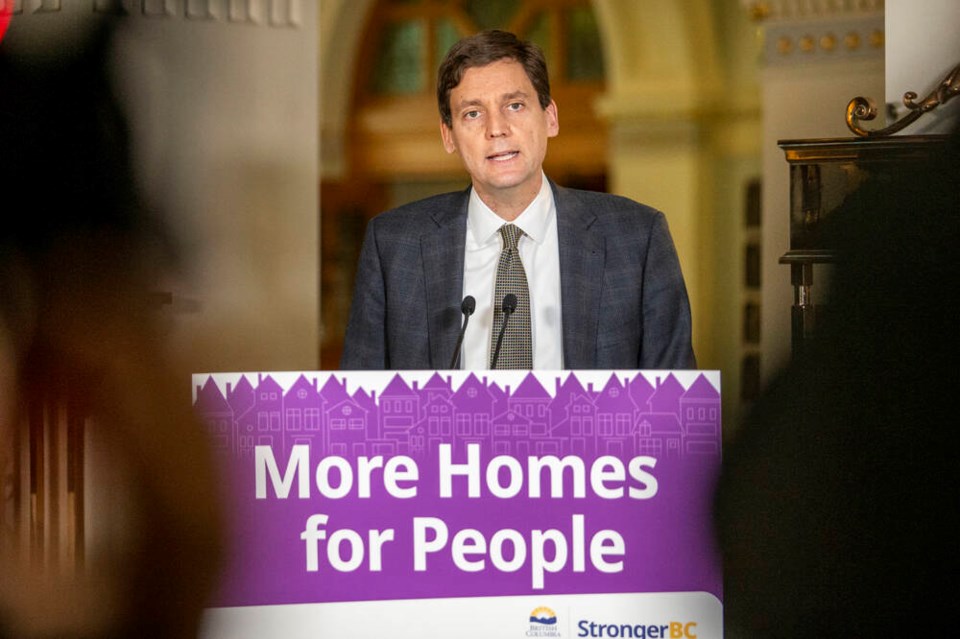B.C. Premier David Eby said the province is creating a standalone Ministry of Housing to tackle affordability and supply issues for both renters and owners, a move Greater Victoria housing advocates are applauding.
“For the first time in British Columbia’s history, we will have a dedicated minister of housing that is only focused on housing and delivering housing for British Columbians across the province,” said Eby.
Eby made the announcement on Tuesday during a speech to about 1,400 attendees at the Housing Central Conference at the Sheraton Wall Centre Hotel in Vancouver. The annual conference on affordable housing is held by the B.C. Non-Profit Housing Association, the Aboriginal Housing Management Association, and the Co-operative Housing Federation of B.C.
“We are going to deliver together the most ambitious housing plan in North America, we’re going to make it happen together,” Eby told the audience.
The yet-to-be-named minister won’t take office until swearing in of new cabinet ministers on Dec. 7 and how much money will be available won’t be known until the February budget but the intention is to take the ministry out from under the Ministry of the Attorney General, led by Murray Rankin, and give it its own budget and ministry.
“It’s significant news,” Eby said, whose portfolio before he became premier included housing. “In my opinion, it is vital that we have a minister around the cabinet table that has one job and one focus only, which is to deliver on housing.”
Sylvia Ceacero of the Greater Victoria Coalition to End Homelessness said the news may signal the “dawn of a new day.” She was in the audience in Vancouver and she stood with others to give the new premier a standing ovation.
“It was exhilarating to be in that room when he made that announcement because having a ministry dedicated to housing means the government is taking the issue very very seriously,” said Ceacero.
It’s estimated that 1,300 people in Greater Victoria are without homes, said Ceacero.
Advocates have been working with the government on a strategy with the goal that homelessness — either people living on the street or those who are precariously housed — is something that happens briefly or sporadically but that is not a way of life, she said.
Aryze Developments urban planner Luke Mari, an advocate for diverse housing and urban infill projects, said the creation of a separate ministry for housing is a “narrative shift; it speaks to the seriousness of the problem.” Mari said he found even greater signals of government’s renewed commitment to housing in reading the bills introduced Monday in which the province talks of working in consultation with municipalities to set and hit housing targets.
“There’s a few line items in there that refer to housing supply as ‘in the public interest,’ ” said Mari.
“In legislation, words matter, so if that is the lens in which the province is starting to look at housing, you have to assume all the changes coming now and in the future are going to roll out with the public interest in mind and new housing being a key part of that,” said Mari.
Kathy Whitcher, executive director of the Urban Development Institute — Capital Region, said a new ministry will make “a big difference” and is hopeful the many challenges facing housing will receive more attention “and things will be addressed faster.”
Whitcher said even as former housing minister — under the Attorney General Ministry — Eby was making strides on the housing front.
“I don’t think we’ve ever had a minister stand up for the development industry like he did,” said Whitcher. “So I’m hopeful that by creating this ministry on its own, he’ll continue that great work he was doing.”
B.C. Liberal Leader Kevin Falcon expressed frustration in a media availability that Eby was not in question period on Tuesday, one of four last days in the fall sitting, and was instead delivering speeches on the mainland.
News of the new ministry comes a day after Eby introduced two bills that will set housing targets for up to 10 fast-growing municipalities, end rental restrictions for about 300,000 condos and ban age restrictions that squeeze out families with children from housing.




